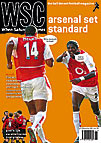 Sepp Blatter is promising Oceania automatic entry to the World Cup, again. Matthew Hall thinks this time he may actually come up with the goods
Sepp Blatter is promising Oceania automatic entry to the World Cup, again. Matthew Hall thinks this time he may actually come up with the goods
To be or not to be? That’s the question for the Oceania Football Confederation as FIFA promises the qualifying process for the 2006 World Cup will be decided in Madrid this December. The proposal, from none other than the president Sepp Blatter, is that Oceania takes the guaranteed qualifying place freed up by the decision that the holders will no longer qualify automatically for future World Cups.
Currently, OFC’s winners are not guaranteed a direct place, having to play off against the off-cuts and also-rans of other Confederations. It is a system that has seen representatives from the Pacific appear at just two finals since the confederation’s formation in 1966: Australia in 1974 and New Zealand in 1982.
Oceania received full-member status of FIFA in the late 1990s, ironically just after a scheme had been formulated by then-Soccer Australia chairman David Hill (the man who took Terry Venables Down Under) to shut down OFC and merge with Asia. At a FIFA congress in 1997, Hill’s masterplan was put to the vote. Only Australia was for it. It was an embarrassing defeat, but Hill’s motivation was to underline his belief that unless OFC received direct World Cup qualification, its existence was pointless.
Blatter’s recent drive for inclusion has provided some optimism across the Pacific but until good news from Zurich rolls off the OFC fax machine in Auckland, no one in the region is getting too excited. Direct qualification has been promised for at least a decade and the current blather, especially from Blatter, has been heard many times before.
“In football politics, unless we receive the letter from Oceania, I remain reserved about our chances,” Soccer Australia’s chief executive Alan Vessey says. Key words: “football” and “politics”. Oceania overwhelmingly supported Blatter in the election for FIFA’s presidency against Issa Hayatou earlier this year and this could be the key. The OFC president Basil Scarsella, an Australian, has been appointed to the committee investigating FIFA’s finances, while A’hongalu Fusimalohi from Tonga was recently elected to FIFA’s executive committee. It may be no coincidence.
Blatter was sharp in appointing Scarsella to help with sensitive investigations. The chief executive of South Australia’s electricity supplier, Scarsella was head of Soccer Australia when the true state of its finances were clouded in secrecy and misinformation. When a new administration took over the game a year ago it soon discovered Soccer Australia was in terrible debt and even struggled to find the money to send a team to last July’s OFC Nations Cup in New Zealand.
In the wash-up, a squad of players picked from the domestic league lost 1-0 to New Zealand in the final, after only scraping through the semis with a golden goal against Tahiti. Harry Kewell claimed he did not even know the tournament was on until he was told of the New Zealand loss by his Leeds United team-mate Jacob Burns.
Most of the world only learned about Oceania when then-president Charlie Dempsey voted against the wishes of his confederation and handed Germany the 2006 World Cup finals instead of South Africa. Dempsey quit after the 2006 voting fiasco, but it’s said he still holds influence. In the region’s worst-kept secret, Dempsey’s daughter, Josephine, has been general secretary of the OFC for many years. Her married name – King – masks too many probing questions.
Of course, then there is the actual football. Critics of direct entry say the confederation is a farce and point to Australia’s 31-0 hammering of American Samoa during last year’s qualifiers. Australia, when its team is at full-strength (which is all but never), is undoubtedly the region’s giant and, given the opportunity, is capable of mixing it with the world’s best. At the 2001 Confederations Cup in Korea, a Mickey Mouse tournament for some Europeans but an important event for the dollar-starved region, Australia beat France, Mexico, and Brazil.
Of course, it all went pear-shaped again during the World Cup play-off against Uruguay, South America’s fifth-placed side. Australia’s preparation was a single friendly against France in Melbourne, a week before the two-legged showdown. Uruguay came off 18 qualifying matches and, street-fighters that they are, knew exactly how to handle the sudden death situation.
“I think that every confederation should have a representative at the World Cup and this includes Ocea-nia,” Blatter said before he visited Australia in August in a whirlwind tour that included breakfast with the prime minister. “I do not think my proposal will be turned down.”
Judging Blatter’s post-World Cup form, that what he wants he now seems to get, it may take a suggestion from way out of left-field to deny Oceania its place in Germany.
From WSC 189 November 2002. What was happening this month